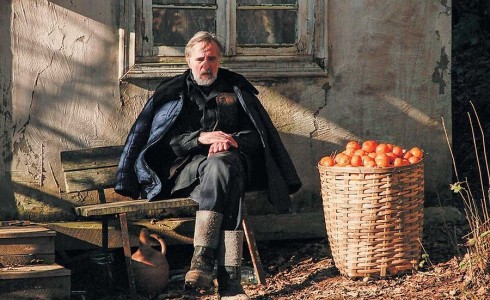Movie a Day Blog feels that in this very strong year for the Best Foreign Language Film Oscar, the most overlooked film had to be TANGERINES (2013), which was also one of the best.
The winner was IDA (2023) and WILD TALES (2014, Movie a Day 2/21/15) made a strong run at the end. I’ve already posted how excellent I found both TIMBUKTU (2014, Movie a Day 2/11/15) and LEVIATHAN (2014, Movie a Day 2/8/15).
TANGERINES therefore had a tough go of it, especially since it had a less interesting subject: a minor war in 1992 between Russians and Georgians over a section of the Caucasus largely settled by Estonians. Almost all of them have fled, leaving only Ivo (Lembit Ulfsak, a terrific film presence), a crate-maker, and Margus, (Elmo Nuganen), the owner of a tangerine orchard.
Both men are dependent on the crop being harvested, a difficult accomplishment in the midst of a bloody and close-up war. The immediacy of the conflict presents itself right away, as a Chechen mercenary and his partner are ambushed and one of them killed in the film’s first 10 minutes.
The surviving professional soldier, very well played by Giorgi Nakashidze, is offered medical aid and recuperation by Ivo, to his and our surprise, since he was not particularly pleasant in Ivo’s initial encounter with him that begins the film.
Matters are further complicated when Ivo and Margus are burying the attacking Georgians, and discover one of them is still alive. They haul him out of the grave and Ivo takes him in, too, with the two enemies now occupying different bedrooms in the same house.
Writer-director Zaza Urushadze, a Georgian filmmaker who has four previous features to his credits, does a skillful job of maintaining the atmosphere of a high-tension wire in Ivo’s small cottage. Ivo and Margus attempt their harvest, but the objects of the title that motivate the action never get picked before everything begins to go wrong.
TANGERINES is a wonderful example of how a large conflict can be boiled down to a small domestic drama that carries real emotion and punch to its characters and their interactions. Urushadze gives each man involved a distinct point of view, even if they share murderous intentions toward each other.
Most of the time in TANGERINES is spent seeing the men recover physically, and unexpectedly, emotionally as their close quarters make them recognize similar aspects in each others personality. They will never be friends — their nationality and religion (the Chechen is a Muslim, the Georgian a Christian) — but they also do not remain absolute enemies.
The denouement is inevitable, but TANGERINES manages to be surprising right up until the end. The real villain of the story is not either of the warring sides, but the depressing and deadly nature of war itself.
A pompous officer who shows up at the end and hastens the story’s conclusion shows the true nature of conflict: senseless violence justified by the reality of no more civilized rules. It’s a depressing conclusion being played out all over the world, from the Ukraine to Syria to Nigeria.
TANGERINES doesn’t offer any radical solutions except the humanity of its participants. In the end, that’s probably the best thing we have going for us.



Comments are closed